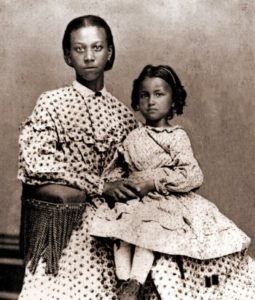
Ella Sheppard
*Ella Sheppard was born on this date in 1851. She was a Black musician, vocalist, and educator.
From Nashville, Tennessee, her father, Simon Sheppard, hired his time from his master and worked hard to accumulate $1,800 to buy his freedom. Ella's mother, Sarah Hannah Sheppard, was not as fortunate. Her mistress promised Simon he could buy Sarah, but the slave owner refused to honor the agreement. Determined that Ella would not remain a slave, Sarah threatened to "take Ella and jump into the river than see her a slave." Fearing the loss, the slave mistress sold Ella to Simon Sheppard for $350.
Young Sheppard remained in Nashville with her father when her mother was taken to Mississippi. Simon married another slave woman and gave $1,300 for her freedom. A race riot hit Nashville in 1856, causing whites to tighten the controls on local free Negroes; his business debts soon could not be paid, and Simon fled to Cincinnati, Ohio, to prevent his family from being seized as assets and sold as slaves. Young Sheppard attended a colored school and studied music in Cincinnati.
She had exceptional musical talent; her father bought a piano and paid for private lessons. Simon Sheppard died in 1866; though bills were paid, Ella and her stepmother were penniless. To help support the family, Sheppard played the piano at local functions. A prominent local piano teacher agreed to help Ella continue her musical education. She became this man's only Black pupil, and Ella had to keep the lessons a secret by entering the school through the back door between nine and ten o'clock at night. In 1868, Sheppard accepted a teaching position at Gallatin, north of Nashville. The poor Black students paid tuition so seldom that she saved only six dollars after five months of work.
Yet she took this money and entered Fisk University, where her six dollars lasted three weeks. She earned enough money to continue school for two years by teaching music in Nashville. Sheppard became the music teacher at Fisk University, the only black staff member before 1875. To relieve the school's serious financial deficiency, Fisk's treasurer, George L. White, organized a group of students to sing for money. The first tours became so promising that White was permitted to form a group and go on a national tour. Sheppard became one of nine singers selected by White to form the Fisk Jubilee Singers. She served as a pianist and assistant trainer. On October 6, 1871, the group went on tour.
The first tour netted $20,000 to pay for a new campus site at Salem and Jefferson Street. As majestic Jubilee Hall slowly rose on the site and the school needed more funds, the Jubilee Fund often became the only source of money for the school. So, the singers had to extend their concert tours. The Jubilee Singers raised $150,000 in America and Europe in seven years. Sheppard worked as the backbone and trainer for the group. In 1882, Sheppard married George W. Moore. She spent many years helping George in his work with the American Missionary Association, lecturing throughout the South, and organizing Jubilee choirs.
Eventually, she found her mother and sister in Mississippi and brought them to Nashville. Ella Sheppard died on June 9, 1914. She was buried in Nashville's Old City Cemetery.
Dark Midnight When I Rise
By Andrew Ward
Published by Farrar, Straus & Giroux
ISBN: 0374187711